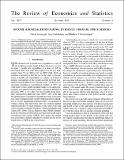Income and Health Spending: Evidence from Oil Price Shocks
Author(s)
Acemoglu, Daron; Finkelstein, Amy; Notowidigdo, Matthew J.
DownloadAcemoglu-2013-Income and Health.pdf (747.4Kb)
PUBLISHER_POLICY
Publisher Policy
Article is made available in accordance with the publisher's policy and may be subject to US copyright law. Please refer to the publisher's site for terms of use.
Terms of use
Metadata
Show full item recordAbstract
Health expenditures as a share of GDP in the United States have more than tripled over the past half-century. A common conjecture is that this is a consequence of rising income. We investigate this hypothesis by instrumenting for local area income with time series variation in oil prices interacted with local oil reserves. This strategy enables us to capture both partial equilibrium and local general equilibrium effects of income on health expenditures. Our central income elasticity estimate is 0.7, with 1.1 as the upper end of the 95% confidence interval, which suggests that rising income is unlikely to be a major driver of the rising health expenditure share of GDP.
Date issued
2013-10Department
Massachusetts Institute of Technology. Department of EconomicsJournal
Review of Economics and Statistics
Publisher
MIT Press
Citation
Acemoglu, Daron, Amy Finkelstein, and Matthew J. Notowidigdo. “Income and Health Spending: Evidence from Oil Price Shocks.” Review of Economics and Statistics 95, no. 4 (October 2013): 1079-1095. © 2013 by the President and Fellows of Harvard College and the Massachusetts Institute of Technology
Version: Final published version
ISSN
0034-6535
1530-9142